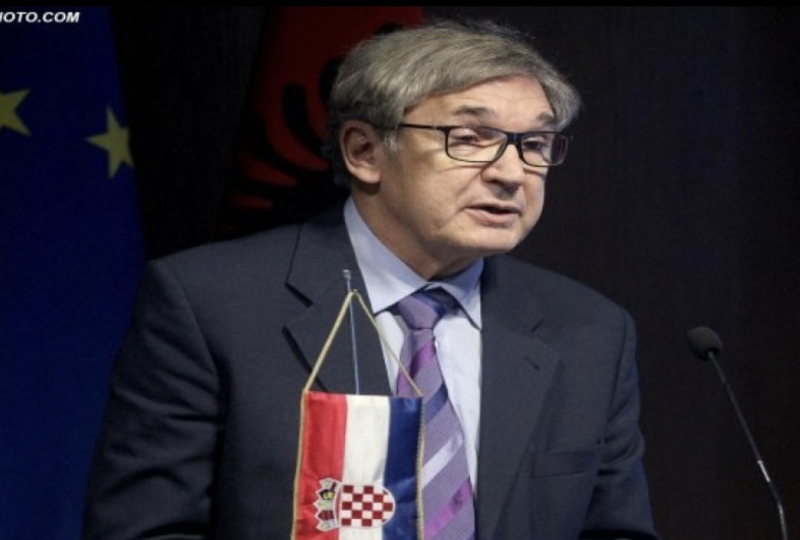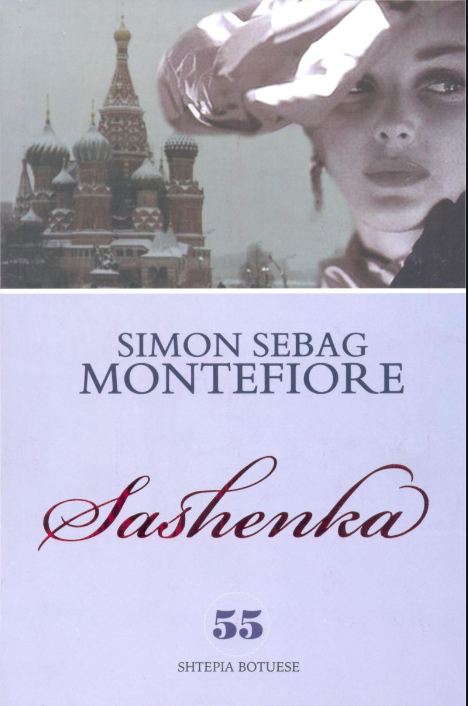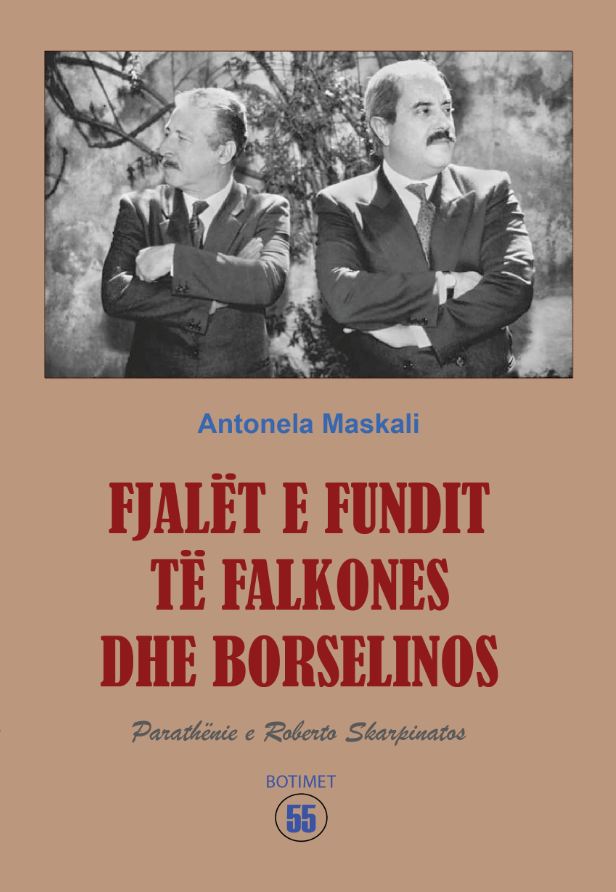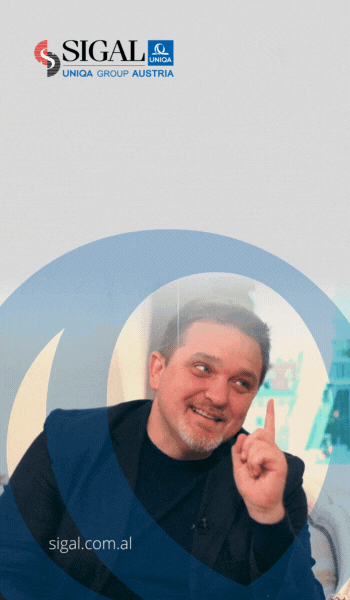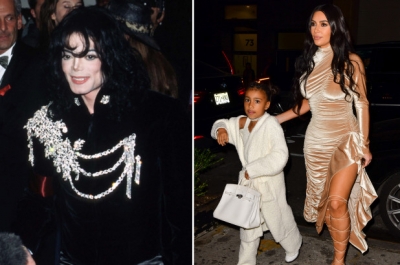Before starting the interview I asked the Ambassador of Croatia to Albania, Zlatko Kramaric, what 'small suggestion he could offer about the topics of the talk. The Ambassador was polite enough to mention 2-3 topics, concluding by saying: "What to suggest, everything is 'interesting'"!
At that moment it came to my mind a warning of the UN Secretary-General António Guterres in a speech at the UN in 2024: "Around the globe, and across the range of issues, peace is the missing piece... Peace is a rallying cry. It is a call to action. Our obligation is to act together for peace in all its dimensions."
And Ambassador Kramaric touched upon in the exclusive interview with Albanian Daily News some current crises like the Russian aggression against Ukraine, the Israeli-Palestinian war, the conflicts in the WB focusing on those between Kosovo and Serbia and the situation in Bosnia.
"The EU does not have a unified position on the
'Kosovo issue' - so no one has yet been responsible for that terrorist act, the armed invasion groups from Serbia, the leader of that action moves freely in Serbia. It is clear to everyone that Belgrade is fueling the crisis in the north of Kosovo, dialogue between Belgrade and Pristina is not working, the Brussels agreement is also ignored," said the Ambassador.
Croatian top envoy in Tirana also dwelt on the upcoming European elections, the visit of the Chinese President, Xi to Belgrade and other topics which are found in the following interview:
Albanian Daily News: Elections for the EP will be held in early June this year. Do you think there will be a new face of that high EU institution and what are the repercussions of such a development in the block and the world?
Ambassador Zlatko Kramaric. I hope that after these elections for the European Parliament, there will be some positive changes, first of all, in a clearer definition of a unified European policy. I repeat, if you want to play a more significant role in the formation of new relations in the world, (new distribution of power), then EU-politics must be unique, with precisely defined goals and methods by which these goals will be achieved. In other words, we need to work to create such an environment in which important decisions can be made without Europe asking anything. Europe must not allow itself to be a silent observer of what is happening in the world.
And in order for something like that to come true, the big EU countries such as Germany, France, Italy, Spain, the Netherlands etc, must suspend their particular interests in favor of this unity. Therefore, such assumptions must be created that important political decisions are made quickly with full respect for all democratic procedures. Opportunities in the world demand it -war in Ukraine, conflict in Gaza, as well as a whole series of other unresolved issues, among others. There are also unresolved relations in the Balkans, which can easily escalate.
Are Croatian citizens showing interest in this event and what are their expectations from these elections in EP against the background of an overall crisis as humanity is more and more threatened by a new world war?
I have to be honest, I am also interested in how many Croatian citizens will vote for these EU elections, which will be held on June 9. As you know, parliamentary elections were held in Croatia on April 17, and we were all pleasantly surprised by the number of citizens who turned out for those elections. There is no doubt that the citizens were highly motivated to vote in those elections and to actively participate in determining the future composition of the Croatian parliament. In this way, they also determined the direction of future Croatian politics. These national elections unequivocally showed that the citizens of Croatia see their country as an integral part of a large European family in which all liberal-democratic values are respected. Therefore, I expect similar motivation, enthusiasm repeated in the recent elections for the European Parliament.
We are aware that electoral activities, the creation of a parliamentary majority, the formation of a new/old government pushed these EU elections to the background. Fortunately, these activities did not last too long, so I expect that from next Sunday, a real campaign will begin, in which not only the real questions will be raised, but also some adequate answers will be given to pressing problems (migration, demographic deficit in all EU countries, dramatic climate changes, until those related to rehabilitation of horrors the consequence of Russian aggression against Ukraine, first of all, the issue of energy, which is the result of the systematic destruction of Ukrainian infrastructure...). But in the same way, we expect the candidates for the EU Parliament to offer answers to some of the most important political questions, about how they see the expansion of the EU to the countries of Western Balkan, as well as all the topics related to the issues of open misunderstandings between the EU member states and those who are in position candidate Bulgaria/Greece vs. North Macedonia, Greece vs Albania, how do they think Croatia should position itself towards its neighbors Serbia, Bosnia, Montenegro, what do they think about the German-Slovenian proposal that future decisions in the EU be made by a qualified majority and not unanimously as before.
It seems to me that many people in Croatia are still not sufficiently aware that Croatia is a full member of the EU. This feeling is especially present among a certain part of Croatian politicians who see themselves as representatives of sovereignist policies, and Orban is their political role model. Fortunately, in these elections, these options did not receive a large number of votes, but that only means that it is still necessary to persistently explain the benefits of membership in the EU (but also in NATO) to the citizens. It was not by chance that the old Latins said that repetition is the mother of wisdom - repetitio est mater studiorum!
Of course, all these activities must be directed towards achieving a just peace, preserving the territorial integrity and sovereignty of individual states. And as always, one should fight for peace with all available means and we should insist on political solutions, agreements.
Finally, all conflicts end with peace agreements, and then it is better to reach those agreements as soon as possible. So far, too many civilians and children have died in Ukraine and Gaza. It has to stop! And Europe must be involved in solving all these conflicts. That is also her sacred obligation!
And yes - we must never forget that Europe is the most beautiful place to live!
- Mr. Ambassador, the relations between China and Serbia have entered a new stage after the recent visit of President Xi to Belgrade joining the Chinese initiative of the so called the "shared future" becoming the only Balkan country and a candidate to join the EU as part of this Chinese bid to forge stronger relations with allies at the edge of the European Union. Please two questions: how will Brussels react to this move and secondly, are we witnessing the creation of a new pole Beijing-Moscow-Belgrade...?
- I myself share your dilemmas regarding the visit of Chinese President Xi to Belgrade.
Everything you stated is correct, Serbia, even though it is a candidate for EU accession, voluntarily agreed to be part of the Chinese initiative - 'shared future'; I'm also interested in how Brussels will react to this provocation (and let the schizophrenia be complete, Vucic continues to say that Serbia is on the European path, and this was repeated by the new prime minister in his presentation in the National Assembly when he presented the program of the new government).
However, I agree with your position that a new (geo) political bloc - Russia-China-Serbia - is being created openly, without hiding, on the periphery of the EU, which should not be underestimated. The messages are more than clear, but the US and the EU are on the move - they must be clearly defined according to this new-old card shuffling.
We have all been hearing about Serbia sitting on more chairs' for too long, but we are also witnesses that its 'indecisiveness' is tolerated.
Serious theoreticians write about the return (and, of course, the importance) of geopolitics. I hope that there are politicians who not only read their studies, but also understand them. The next step should be their concrete reaction to these activities, which are not innocent at all.
I hope that this visit of Chinese President Xi to Serbia will not pass under the radar. And, also, I am convinced that Vucic decided to call the Chinese for help because of the bad economic situation in Serbia. I just hope that he knows the experiences of some other, first of all, African countries, but also neighboring Montenegro, what a wasteland remains after the Chinese credit! However, it is not our place to teach others what they should do.
I have to admit that this visit by President Xi reminded me of some earlier times, Tito's times - cheering people, by the way, 'spontaneously' brought from all over Serbia for the occasion, Chinese-Serbian flags, chants, and welcoming speeches were are structured as if he wrote them some communist ideologue, so we could hear phrases like - 'steel friendship, 'we are writing history' - a kind of deja vu! All in all - as before - bread and games/panem et circenses!
In the last few days more and more 'rumors' are being heard that Kosovo's membership in the Council of Europe may be conditional upon the formation of the Association of Municipalities with a Serbian Majority of the Republic of Kosovo according to the Serl scheme. What is detrimental to Kosovo is that Germany has apparently supported the Serbian idea. Mr. Ambassador are events taking a new course getting stronger support from big EU powers like Germany and France which might harm Kosovo people?
- The situation in Kosovo and with Kosovo is not great at all. My earlier optimism (abolition of the visa regime, the possible entry of Kosovo into the Council of Europe, the possibility of recognition by Serbia, the brilliant performance of the President of Kosovo at the UN) has now turned into 'mild' pessimism, because it is more than evident that different political and economic interests intersect/conflict in Kosovo - in short: the EU does not have a unified position on the 'Kosovo issue' - so no one has yet been responsible for that terrorist act. The armed invasion groups from Serbia, the leader of that action moves freely in Serbia, it is clear to everyone that Belgrade is fueling the crisis in the north of Kosovo (boycott of local elections, abandonment of institutions by Serbian representatives), dialogue between Belgrade and Pristina is not working. The Brussels agreement is also ignored.
If we want to be honest, then it must be said that both parties must respect and implement signed agreements, as well as unsigned ones, such as the Ohrid one, but with the presence of serious witnesses.
I am aware of all the possible implications that may arise from the creation of Serbian communities of municipalities (however, this Community still does not have the same political and legal status as the Republika Srpska has in Bosnia and Herzegovina after Dayton, but it is high time that the Kosovo government clearly determines protection of minority rights.
I can understand the political position of A. Kurti regarding that painful issue, but some things were previously agreed and signed, so that fact should be respected. I admit that there are some ambiguities in those documents, but it should also be remembered that there are also very serious guarantors (America, EU, international community) of Kosovo's full independence and territorial integrity!
- Mr. Ambassador, what will be the stance of Croatia if a new division of Kosovo is underway when Serbs have become more aggressive in Bosnia and the objectives of the creation of Greater Serbia are becoming more and more arrogant?
- Croatia cannot agree to any new divisions (replacements) of territory in the area of the Western Balkans. That would be the beginning of the end, because it would not have happened without war! And everyone who advocates that option should be aware of that fact. Colonial solutions are no longer possible. Such, at first glance, 'elegant' solutions cannot be achieved without war. Finally, the opening of new crisis zones is not in Europe's interest, and it is very clear what political strategies are behind M. Dodik's policy - he is consciously provoking!
And the problem is not in his actions and aggressive behavior, but in those who tolerate it all. We don't need Gaza in Europe and something like Gaza would be a new attack on European unity. Dodik is aware of this fact, so he behaves like an elephant in a glass factory!
Such behavior must be sanctioned and it must not be allowed to open another crisis zone in the Balkans. The agreement in Dayton was reached precisely because of the desire to end the war in Bosnia. Likewise, it is known exactly who, in this situation, needs unrest in the Balkans the most, who benefits from the dispersion of the crisis.
Therefore, I fully agree with your introductory comment that peace in the world has no alternative and that everything should be done to achieve such a state.
Please, how do you see the future of North Macedonia as the victorious nationalist party will likely have a major effect on the Balkan country's dream of joining the European Union as Mickoski has refused to acknowledge the country's new name and an agreement with Greece in 2018, which added "North" to its title to settle a long-running dispute and allowed the country to join NATO. The opposition leader has also vowed to stand firm in a tussle with Bulgaria over linguistic and historical issues that has seen Sofia block North Macedonia's EU accession talks for the past two years?
The results of the parliamentary and presidential elections in North Macedonia do not come as a surprise to me. All that, more or less, was expected. The citizens were not satisfied with how the previous, 'left' government solved political and economic issues in the country. We have to be honest and say that there were also a lot of objective difficulties. This especially applies to European policies, the blockade by Bulgaria which further irritated the citizens of Macedonia... It will be interesting to see how the new, "right-wing" government will resolve this "Gordian knot" of Macedonian politics. Namely, it is one thing when you are in the opposition and something completely different when you have gained the trust of the citizens and when you have assumed responsibility for the future of the country.
There is no doubt that there will be a change in the rhetoric of the winning party, but it would be desirable for the EU (read - Bulgaria) to relax a little in its demands regarding the issue of language nomination, certain historical episodes and the ethnicity of certain actors in those episodes, because just like that it is possible to reach a solution that would be equally acceptable to one and the other side.
North Macedonia has already made some concessions on its part (it agreed to change its name), and for that act it was partially remunerated - it entered the NATO alliance.
Now we hope that a solution will be found again that will be acceptable to everyone. The EU path of this country depends on it, which guarantees its long-term stability. I think it should also be the interest of her neighbors! The time of the Balkan wars and the possible division of the Macedonian territory is over!
To conclude, Mr. Ambassador, much has been spoken about a new world order, especially after the Russian aggression against Ukraine. Given the new dangerous developments among which the escalation of the war in Ukraine and the Israeli-Palestine war is the world more threatened by a world conflict?
If someone wanted to change the existing world order through wars, then he chose the worst possible solution. Because when a snowball rolls on top of a mountain, it turns into a terrible avalanche on the way to the valley, which demolishes and destroys everything in front of it.
And one of the world powers decided to roll a 'snowball' that will now be very difficult to stop.
I don't want to play the prophet, but someone has beautifully defined the term crisis - it's that situation when you feel fear not only for yourself but also for other people. And that's exactly how I feel right now - I'm very afraid for the future of humanity! What a world we will leave to our descendants!







